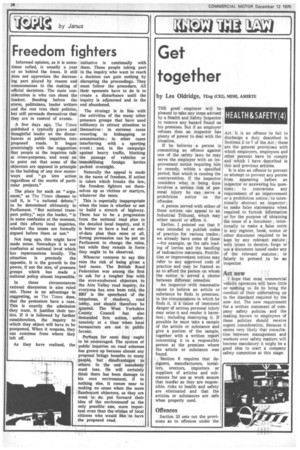Freedom fighters
Page 32

If you've noticed an error in this article please click here to report it so we can fix it.
Informed opinion, as it is sometimes called, is usually a year or so behind the times. It still does not appreciate the decreasing part played by reason and commonsense in the making of official decisions. The main consideration is who can shout the loudest. Bending before the storm, politicians, leader writers and the rest trim their policies, but still persuade themselves that they are in control of events.
A few days ago, The Tunes published a typically grave and thoughtful leader on the disturbances at public inquiries into proposed roads. It began promisingly with the suggestion that people at the inquiries talk at cross-purposes, and went on to point out that some of the objectors are opposed in principle to the building of any new motorI ways and "go into action I regardless of the merits of partiItular projects."
The place for such an "argument," as The Times chooses to call it, is "a national debate," to be determined ultimately in Parliament. "But national transport policy," says the leader, "is in some confusion at the moment, and this affects local inquiries, whether the issues are formally argued before them or not."
Not long ago, this might have made sense. Nowadays it is not confusion at national level which has repercussions locally. The situation is precisely the opposite. It is the growth in the power, if not the size, of pressure groups which has made a national policy almost impossible.
In these circumstances rational discussion is also ruled out. These is no advantage in suggesting, as The Times does, that the protesters have a case. This is exactly the admission they want. It justifies their tactics. If it is followed by further consideration, the inquiry to which they object will have to be postponed. When it reopens, they can continue from where they left off.
As they have realised, the initiative is continually with them. Those people taking part in the inquiry who want to reach a decision can gain nothing by disrupting the proceedings. They must follow the procedure. All their oponents have to do is to create a disturbance until the inquiry is adjourned and in the end abandoned.
The strategy is in line with the activities of the many other pressure groups that have used militancy to attract attention to themselves : in extreme cases resorting to kidnapping or assassination ; in other cases interf erring with a sporting event ; and, in the campaign against heavy traffic, blocking the passage of vehicles or inunobilising foreign lorries parked overnight.
Naturally the appeal is made in the name of freedom. If action is taken which breaks the law, the freedom fighters set themselves up as victims or martyrs, whatever the issue.
This is especially inappropriate when the issue is whether or not to build a stretch of highway. There has to be a progression from the national road plan to the detailed local inquiry, and it is better to have a bad or outof-date plan than none at all. Strong persuasion can be put on Parliament to change the rules, but while they remain in force they ought to be observed.
Whoever ventures to say this runs the risk of being given a bad name. The British Road Federation was among the first to ask for a tougher line with the over-exuberant objectors to the Aire Valley road inquiry. As everyone has now been told, the BRF is the spearhead of the iniquitous, if shadowy, road lobby, and should therefore be ignored. The West Yorkshire County Council has also demanded firm action, unfortunately at a time when local bureaucrats are not in public favour.
Perhaps for once they aught to be encouraged. The system of public inquiries on road schemes has grown up because almost any proposal brings benefits to many people, but disadvantages to others. In the end somebody must lose. He will certainly think there has been damage to his own environment, if to nothing else. It comes near to making no sense when the more flamboyant objectors, as they are wont to do. put forward their idea of the environment as the only possible one, more important even than the wishes of local citizens who would like to have the proposed road.














































































